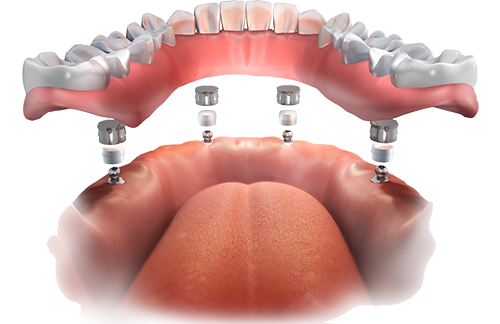Implant Overdentures (Snap In/Out) Hartford, CT
What is an Overdenture?
An overdenture is a unique kind of “snap-on” denture that uses 2-4 dental implants for additional support. Overdentures are sometimes called “implant-supported” or “implant-stabilized” dentures. They have special locators under the base of the denture, which clip onto the corresponding dental implants underneath.
Overdentures in Hartford, CT, are ideal for anyone who has extensive bone loss and may find it difficult to wear a traditional denture. In some cases, Jean Lafayette, DDS in Hartford, Connecticut, may be able to retrofit a newer denture to snap onto dental implants.
Why Choose an Overdenture?
- Improved comfort throughout the day
- No need for messy adhesives or pastes
- Ideal for candidates with bone loss or narrow bone ridges
- Easier to talk and eat with, boosting your confidence

Are Overdentures Right for Me?
Following significant tooth loss, overdentures can help you regain your bite and facial symmetry. If you are missing all of your teeth or your remaining teeth are non-restorable and need to be extracted, dentures are a fast and effective way to restore your smile. Adding as few as 2-4 implants can provide you with increased confidence during daytime wear, preventing your denture from rocking, rubbing, or feeling uncomfortable whenever you’re biting down.
Overdentures are perfect for candidates who want a mid-range alternative between conventional dentures and a full-arch hybrid implant system. Because overdentures are fairly affordable, they provide a predictable upgrade from traditional removable dentures without adding too much to your smile investment.
Call Our Hartford Implant Dentists
Jean Lafayette, DDS, will carefully evaluate your bone anatomy and facial profile to determine whether you would benefit from an implant-retained overdenture. Our variety of denture and implant designs means that we have options for just about anyone, regardless of how many missing teeth you have.
Contact our Hartford office today to reserve a no-obligation exam. Flexible financing options are also available.
YOUR NEW SMILE STARTS NOW
If you're considering overdentures, call our
office to schedule a consultation to find out if you're a candidate for overdentures.
Are You Eligible For A Free Consultation?
